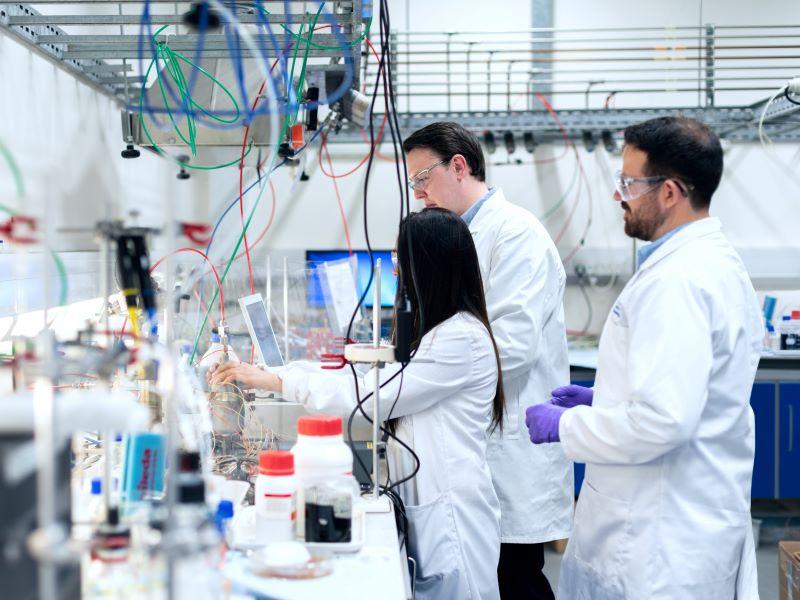Knowledge transfer partnerships (KTPs) – such as Innovate UK’s model – present a prime opportunity for academics to partner with businesses to develop innovative new products or services.
This collaboration and close partnership-working with industry can inspire scholars to think slightly differently in some aspects of their approach to leading KTP projects.
However, it will come as no surprise to read that there are no guarantees for success, or a secret formula to leading a successful KTP: too many variables are beyond your control. However, there are some points to note, which could help increase the likelihood of KTP project success.
For some academics, it might be your first experience of working with industry; for others an opportunity to re-engage after a period away; or, for some, working with industry might be the norm – but this may be the first KTP you have been involved in. The points below are created from reflection on KTPs that have been great successes, and those which have been less successful.
- Lessons from completing an award-winning knowledge transfer project
- The fundamentals of successful student knowledge exchange
- Tackling climate change requires university, government and industry collaboration – here’s how
1. Build relationships
You might not be particularly aware of the industry partner – or them of you – prior to submitting the KTP funding bid. Therefore, it is crucial, at this early stage, to form relationships and start building trust with the company. Elements of this process will naturally occur through the bid-writing process, but it is important to further develop these as early in the project as possible. These positive relationships may become even more important if you are up against challenges and the project is not going as well as anticipated.
2. Recruit effectively
Recruitment of the right KTP Associate – a graduate or postgraduate who will manage the project – is absolutely critical to the success of the project. The funded Knowledge Based Supervisors time, on its own, cannot possibly deliver a successful project, and therefore recruitment of the most suitable KTP Associate is of paramount importance. Choose a recruitment approach that will allow you to be confident in the appointment. Recruitment is important in every role; however, the fixed duration of the KTP projects and the impact the Associate has on the project heightens the necessity to get the appointment right.
3. Be flexible
Remain flexible with the project plan, even though you may have invested significant time developing it. From the company perspective, things can change quickly and you should not be precious about the previously prepared plan if it requires modification. Work with the company to discuss changes, seek guidance from the Knowledge Transfer Adviser and adjust the plan accordingly.
4. Avoid shrinking violet syndrome
At times, expressing opinions on alternative approaches to the project can be difficult for fear of causing friction or upset. However, failure to express your views can lead to lost opportunities. These views are easier to express when strong a relationship with the company has been developed. On the flip side, sometimes expressing your thoughts and ideas on alternative approaches can lead to developing positive relationships. Ultimately, ensure you communicate your ideas for the project.
5. Be prepared
As with many academic projects, KTPs can require a greater investment of time, or higher short-term peaks in workload than you perhaps anticipated. Any additional investment in your time often pays dividends but institutional understanding and support in all this is vital.
6. Scan the horizon
Look beyond the current project resources at ways in which you can support the company. Examples that have been useful in past KTP projects include parallel student projects, the use of wider university resources, seeking alternative funding sources and looking to develop internships. Many of these can help demonstrate Knowledge Base impact.
7. Look after the pennies!
Ensure that both you and the Associate have close control of the budget. This provides both the obvious and essential management of finances, as well as confidence in the wider management team that other, less visible, aspects of the project are also under control.
8. Be collegiate
Try wherever possible to include less experienced KTP colleagues in the process. Remember, everyone was inexperienced at some point. This provides alternative views and experience, additional support and builds institutional capacity.
9. Be humble
Seek guidance from experienced colleagues, a Knowledge Transfer Advisor and the central or institutional KTP Centres. A number of challenges that you may face will likely have been faced before. KTP colleagues will be more than happy to help.
10. Be patient
Be prepared for the fact that academic publications may not be the highest priority for the company. Accept that these may have to be scheduled later in the project. But academic output is an important metric when the project is assessed and therefore cannot be omitted, regardless of how successful you think the project was.
The points above are probably familiar to those with previous or current experience of KTP projects. While not exhaustive, they will hopefully provide some experiential advice for those new to leading KTP projects.
Most KTP projects are successful and are an excellent way to nurture innovation that directly impacts industry and society. I can say with complete honesty that the rewards of engaging in Knowledge Transfer Partnerships far outweigh any challenges they may present.
Tony Leslie is a senior lecturer at the University of the West of Scotland.
He led a project that has been shortlisted for Knowledge Exchange/Transfer Initiative of the Year at the Times Higher Education Awards 2022. A full list of shortlisted candidates can be found here.
If you would like advice and insight from academics and university staff delivered direct to your inbox each week, sign up for the Campus newsletter.




comment